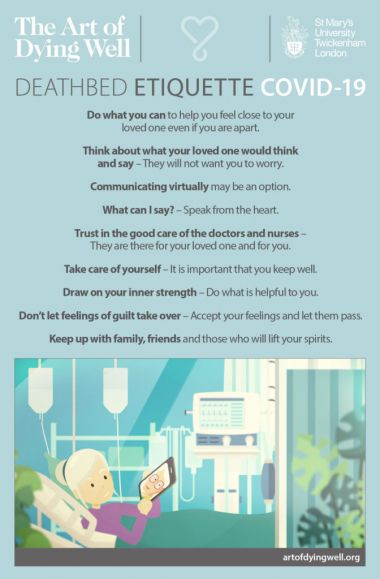Deathbed etiquette guidance offers advice on how to say goodbye to loved ones during pandemic

A new guide on deathbed etiquette has been developed for people facing the difficult prospect of saying goodbye to a loved one during the coronavirus pandemic.
The guide has been developed by the Centre for the Art of Dying Well, a project run by St Mary's University, London, to address some of the specific challenges arising from the strict social distancing measures preventing people from being by a relative's or friend's side.
It encourages people not to feel guilty and to speak to loved ones "from the heart".
"Reassure them that you will be ok," it says.
"Remind them that they will always be with you, in your heart and in your memories. Tell them that they are free to let go – this 'permission' is often taken.
"Do not be afraid of silence. Speak to them in your heart and imagine them talking to you."
Some 18,000 people have died in the UK from coronavirus. The guide has been released at a time when many people saying goodbye to dying friends or family are having to do so over the phone or through Skype.
Other suggestions in the guide including lighting a candle or saying a prayer, and drawing on religious or spiritual beliefs from strength.
"In the bleakest of times our deepest beliefs can be shaken to the core," it says.
"We may lose our sense of self and purpose. Try to remember the things that have helped you get through bad times before; you may find strength from your religion or spiritual practice, it might be in the words of a poem, an image or 'losing yourself' for a while in a book or a hobby.
"Be content to be still, to breathe and to allow your body, mind and spirit to restore you."
Dr Jo Elverson, a palliative care specialist and co-author of the guide, said it was helpful to reflect on what loved ones would want.
"It's so important to not feel that this is your fault, not feel that you should be breaking the rules or doing anything differently," she said.
"This is the situation we're in, and it is absolutely fine to acknowledge that it's sad, that it's not what we wanted, but we have to make the best of it, and the really important thing is to stay safe.
"And I think some of that is maybe thinking, what would your loved one be saying to you if they were able to, and recognising that actually they would probably be more concerned for your wellbeing than they are for their own, and actually, if that means you staying at home and staying safe, that is probably what they would want for you."











